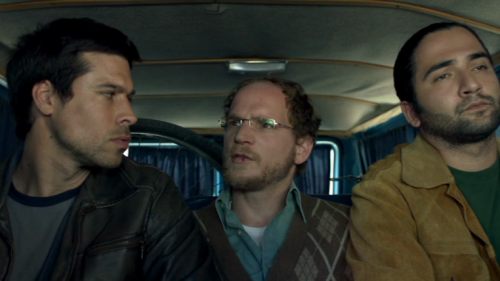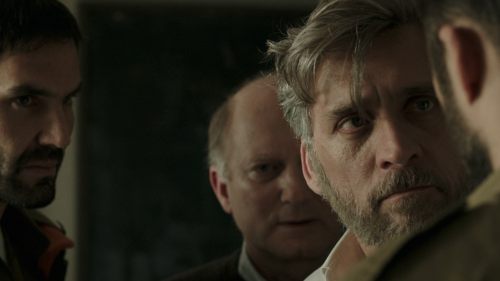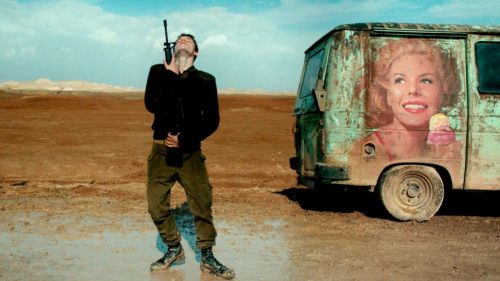FOXTROT Review: A Delicate Dance Of Death
Death: it’s both inevitable and unthinkable, significant and mundane, meaningful and pointless. We place so much weight on deaths that they often even come to define lives - both those of the deceased and those of the people they leave behind.
Samuel Maoz’s Foxtrot is a film all about death. It tells the story of the death of an Israeli soldier (Yonaton Shiray) via a triptych of sequences - his parents, being informed of his death; the events leading up to it; and a return to his parents six months later. Each has specific things to say about death and how it affects the living. Each is laced through with dark ironies and subtle character observations. And each helps add up to a comprehensive, emotive, and entertaining essay on grief.
Foxtrot’s first act centres on Michael Feldmann (Lior Ashkenazi) in the hours immediately after the military informs him (and his wife Daphna, who promptly has a panic attack and is sedated) that his son has “fallen in the line of duty.” It follows Michael through his first day of grief, charting its intellectual, emotional, social, and even biological effects. Michael's journey, like any journey of grief, is full of surreal and often absurd episodes, brought about by the likes of family dramas, military funeral negotiations, and the bizarre need to do everyday things amidst it all. Appearing in almost every single frame of the segment, Ashkenazi is utterly magnetic in his role, saying as much with the concealment of emotion as with the expression of it. It’s a masterful screen performance.
In stark contrast to what one might expect from a soldier killed in combat, Jonathan’s final days are defined by boredom. Jonathan and his squadmates guard a rickety, barely-even-there border checkpoint from a water tower and a van, trudging back through the mud at the end of their shift to eat tinned meat and sleep in a gradually-sinking shipping container. It's reminiscent of how the soldiers in Jarhead grow restless and desperate to fire their weapons - only instead of frustration, they feel a pervasive sense of listlessness. This is where the film's most iconic scene comes in: a soldier dancing with his rifle, wriggling and gyrating around the checkpoint to lively musical accompaniment. Taken out of context, as in the film's trailer, it feels like an odd expression of joy; in the film, it's a way to pass the time.
But where Jonathan's story begins as an entertaining essay on boredom, a mid-film event involving the deaths of multiple civilians changes the tone substantially. Suddenly, we're not thinking of how unnecessary these soldiers’ never-fired rifles are, but the ease and abruptness with which they can kill. The military sweeps Jonathan's sin under the rug, but they can't exorcise it from his soul. Death, again, destroys the living in more ways than is immediately obvious.
The third and final pane of the triptych returns to Jonathan's parents six months later. What transpired earlier has broken them: they've separated, both have taken up smoking again, and their once-immaculate apartment is a mess. Their guilt over Jonathan's death may be misplaced, objectively speaking, but that doesn't make it any less real. It dredges up older guilts, bringing about a swirling mess of self-loathing that brings down both Michael and Daphna (Sarah Adler). Indeed, their relationship is the focus of the third act: the effects exerted on it are a testament to death’s ripple effect, and a natural-feeling progression of the story.
There’s nothing political about Jonathan’s death; nothing directly connected to his military service or even bearing a purpose. It's a random stroke of fate, and Israel and the IDF aren’t even mentioned directly in the film. The pointlessness of his death is echoed in that of Michael's own past pointless mistakes - as well as the bureaucratic nonsense spouted by the military, and even the family feuds Jonathan's death brings bubbling back to the surface. It's all silly and devastating at once.
It'd be enough if Foxtrot communicated its various complexities in a merely competent way, but the filmmaking on display here is sublime. Maoz directs with a level of precision usually only afforded short films, where each shot can be pored and lavished over. Every shot here is exquisitely framed and elegantly choreographed, including some bravura crane sequences. It's a masterclass in shot design, and as confident as the film's events are haphazard.
Foxtrot is a small film - tiny, even - but as the saying goes, it’s perfectly formed. There are no grand statements about death or grief here, only minute observations of their effects, presented through carefully-considered performances and filmmaking decisions. Laced through with the bleakest sense of humour this side of a Ruben Östlund film, it gets as much mileage from the cruel ironies of life as it does the straightforward pain of death. Gosh, it’s good.
I would have thought I’d be past litigating the Oscars by now, but the fact that Foxtrot did not receive a foreign-language film Academy Award nomination is beyond comprehension. At least we can take solace in Foxtrot’s status as a fine companion piece to the category's winner, A Fantastic Woman. They’re both great films treading overlapping emotional ground, and should be sought out with a quickness.



